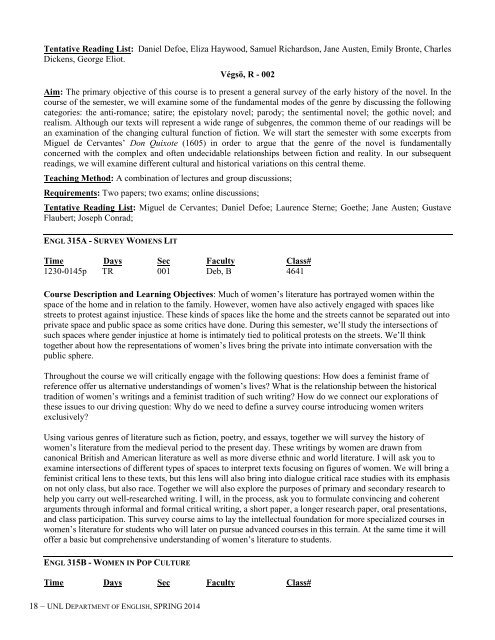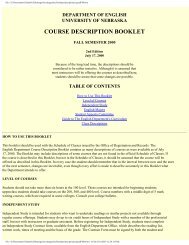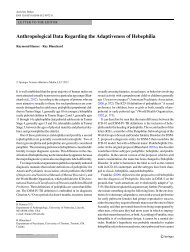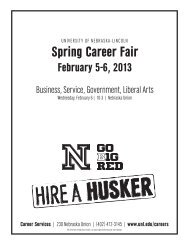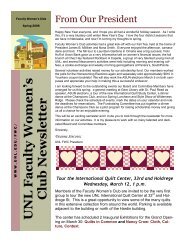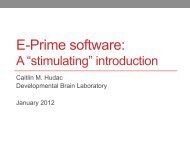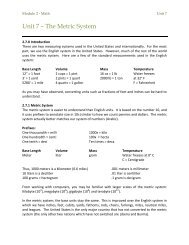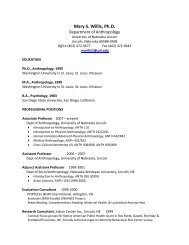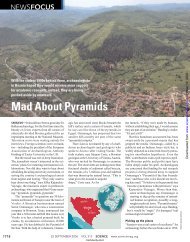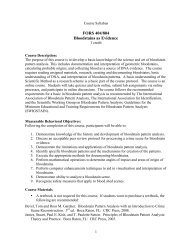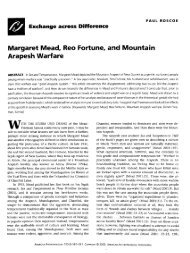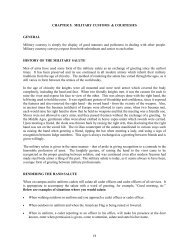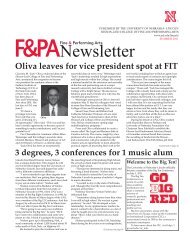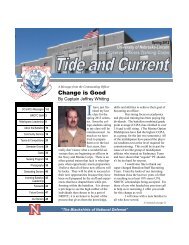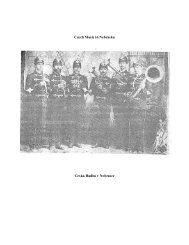COURSE DESCRIPTION BOOKLET Undergraduate Level Courses
COURSE DESCRIPTION BOOKLET Undergraduate Level Courses
COURSE DESCRIPTION BOOKLET Undergraduate Level Courses
Create successful ePaper yourself
Turn your PDF publications into a flip-book with our unique Google optimized e-Paper software.
Tentative Reading List: Daniel Defoe, Eliza Haywood, Samuel Richardson, Jane Austen, Emily Bronte, Charles<br />
Dickens, George Eliot.<br />
Végsö, R - 002<br />
Aim: The primary objective of this course is to present a general survey of the early history of the novel. In the<br />
course of the semester, we will examine some of the fundamental modes of the genre by discussing the following<br />
categories: the anti-romance; satire; the epistolary novel; parody; the sentimental novel; the gothic novel; and<br />
realism. Although our texts will represent a wide range of subgenres, the common theme of our readings will be<br />
an examination of the changing cultural function of fiction. We will start the semester with some excerpts from<br />
Miguel de Cervantes’ Don Quixote (1605) in order to argue that the genre of the novel is fundamentally<br />
concerned with the complex and often undecidable relationships between fiction and reality. In our subsequent<br />
readings, we will examine different cultural and historical variations on this central theme.<br />
Teaching Method: A combination of lectures and group discussions;<br />
Requirements: Two papers; two exams; online discussions;<br />
Tentative Reading List: Miguel de Cervantes; Daniel Defoe; Laurence Sterne; Goethe; Jane Austen; Gustave<br />
Flaubert; Joseph Conrad;<br />
ENGL 315A - SURVEY WOMENS LIT<br />
Time Days Sec Faculty Class#<br />
1230-0145p TR 001 Deb, B 4641<br />
Course Description and Learning Objectives: Much of women’s literature has portrayed women within the<br />
space of the home and in relation to the family. However, women have also actively engaged with spaces like<br />
streets to protest against injustice. These kinds of spaces like the home and the streets cannot be separated out into<br />
private space and public space as some critics have done. During this semester, we’ll study the intersections of<br />
such spaces where gender injustice at home is intimately tied to political protests on the streets. We’ll think<br />
together about how the representations of women’s lives bring the private into intimate conversation with the<br />
public sphere.<br />
Throughout the course we will critically engage with the following questions: How does a feminist frame of<br />
reference offer us alternative understandings of women’s lives? What is the relationship between the historical<br />
tradition of women’s writings and a feminist tradition of such writing? How do we connect our explorations of<br />
these issues to our driving question: Why do we need to define a survey course introducing women writers<br />
exclusively?<br />
Using various genres of literature such as fiction, poetry, and essays, together we will survey the history of<br />
women’s literature from the medieval period to the present day. These writings by women are drawn from<br />
canonical British and American literature as well as more diverse ethnic and world literature. I will ask you to<br />
examine intersections of different types of spaces to interpret texts focusing on figures of women. We will bring a<br />
feminist critical lens to these texts, but this lens will also bring into dialogue critical race studies with its emphasis<br />
on not only class, but also race. Together we will also explore the purposes of primary and secondary research to<br />
help you carry out well-researched writing. I will, in the process, ask you to formulate convincing and coherent<br />
arguments through informal and formal critical writing, a short paper, a longer research paper, oral presentations,<br />
and class participation. This survey course aims to lay the intellectual foundation for more specialized courses in<br />
women’s literature for students who will later on pursue advanced courses in this terrain. At the same time it will<br />
offer a basic but comprehensive understanding of women’s literature to students.<br />
ENGL 315B - WOMEN IN POP CULTURE<br />
Time Days Sec Faculty Class#<br />
18 – UNL DEPARTMENT OF ENGLISH, SPRING 2014


